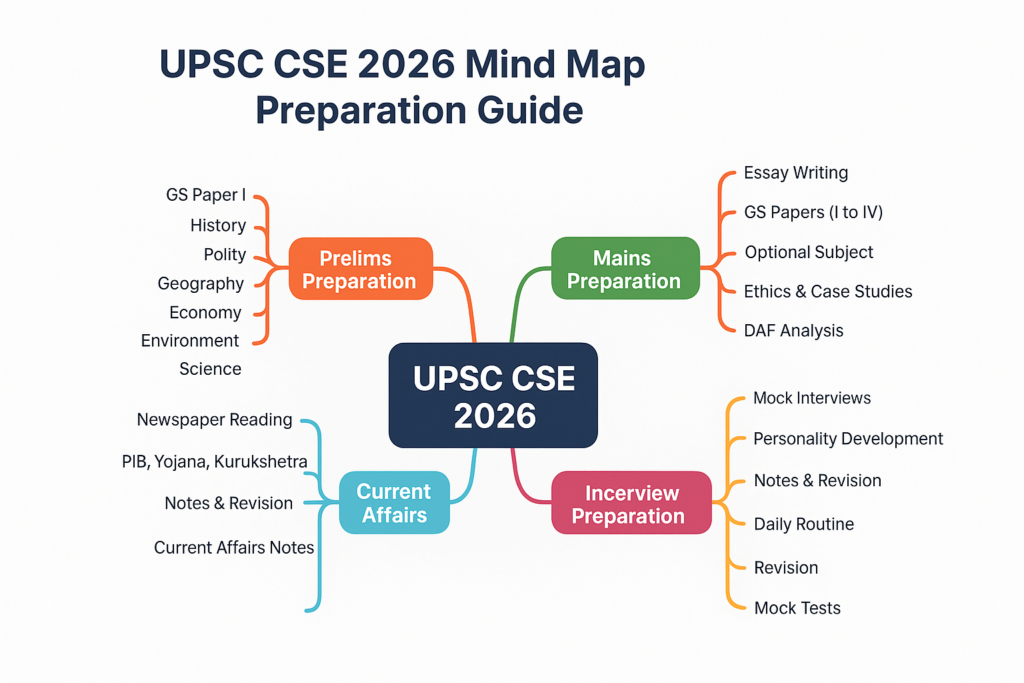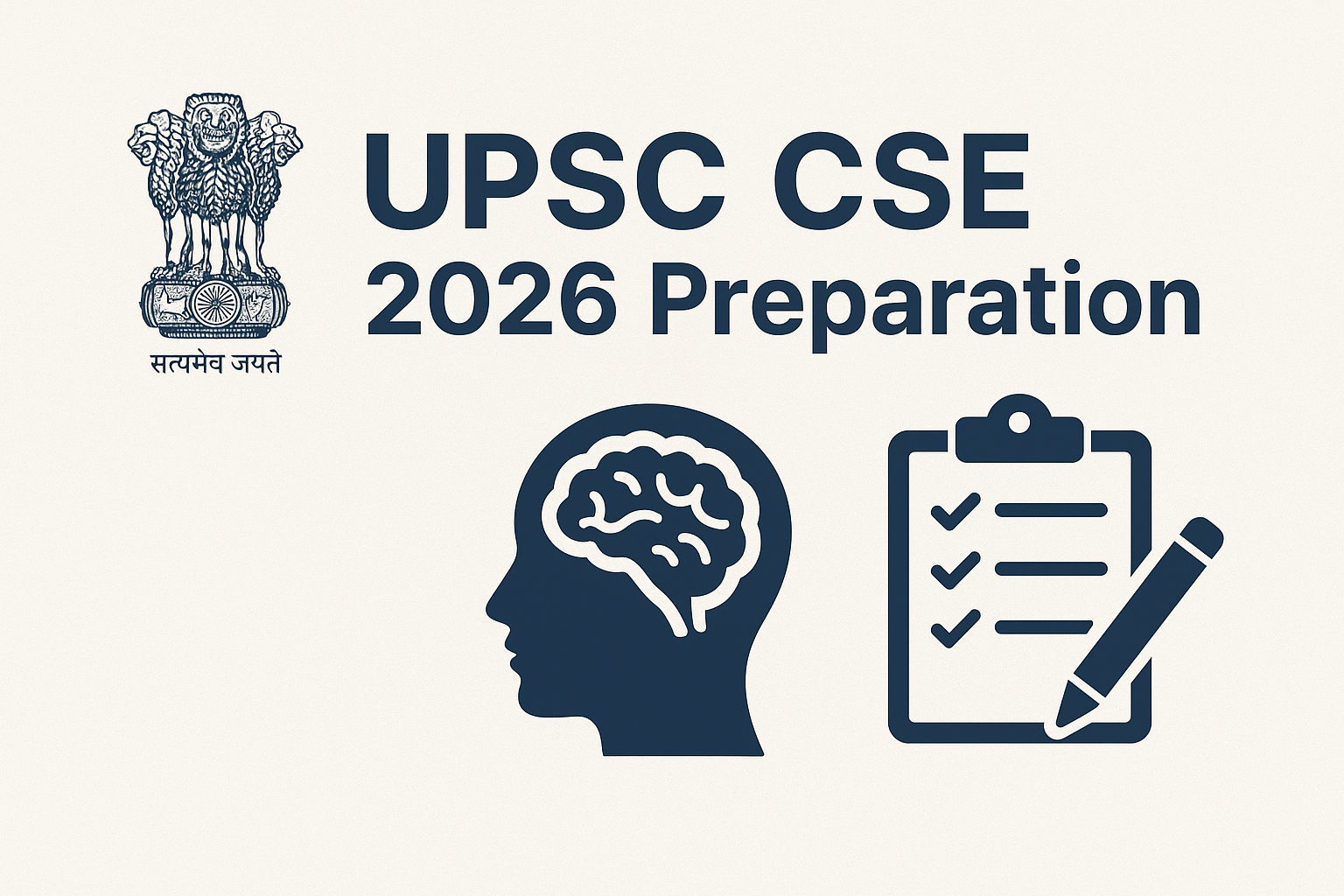Preparing for the UPSC Civil Services Examination [ UPSC CSE 2026 ] requires a clear roadmap, smart strategy, and consistent execution. With lakhs of aspirants competing every year, only a handful make it to the final list. A mind map approach can help you organize your preparation, cover the vast syllabus systematically, and revise effectively.
In this detailed guide, we’ll explore the UPSC CSE 2026 preparation strategy step by step, with a mind map roadmap that covers Prelims, Mains, and Interview stages.
📌 Understanding UPSC CSE Exam Pattern
Before diving into the preparation mind map, let’s first understand the UPSC CSE exam structure:
- Prelims (Screening Stage)
- Paper I: General Studies (200 marks)
- Paper II: CSAT (200 marks, qualifying)
- Mains (Descriptive Stage)
- 9 Papers (Essay, 4 GS Papers, 2 Optional Papers, 2 Qualifying Language Papers)
- Interview (Personality Test)
- 275 marks, assessing personality, communication, and decision-making.
✅ Key Takeaway: UPSC is not just about knowledge, it’s about clarity, expression, and problem-solving skills.
🧠 UPSC CSE 2026 Mind Map (Roadmap Overview)

UPSC CSE 2026
│
├── Prelims Preparation
│ ├── GS Paper I (History, Polity, Geography, Economy, Environment, Science)
│ └── CSAT (Reasoning, Comprehension, Aptitude)
│
├── Mains Preparation
│ ├── Essay Writing
│ ├── GS Papers (I to IV)
│ ├── Optional Subject
│ └── Ethics & Case Studies
│
├── Interview Preparation
│ ├── DAF Analysis
│ ├── Mock Interviews
│ └── Personality Development
│
├── Current Affairs
│ ├── Newspaper Reading
│ ├── PIB, Yojana, Kurukshetra
│ └── Notes & Revision
│
├── Daily Routine
│ ├── Static Subjects
│ ├── Optional Study
│ ├── Answer Writing
│ └── Current Affairs Notes
│
└── Smart Strategy
├── Revision
├── Mock Tests
└── Well-being
📖 UPSC CSE 2026 Subject-Wise Preparation
Prelims Strategy
General Studies Paper I
- History: NCERTs (6–12), Spectrum for Modern India, Nitin Singhania for Art & Culture.
- Polity: Laxmikant + current polity issues.
- Geography: NCERTs, GC Leong, Atlas practice.
- Economy: Ramesh Singh, Economic Survey, Budget.
- Environment: Shankar IAS book + current issues.
- Science & Tech: Basic NCERTs + newspaper coverage.
CSAT Paper II
- Regular practice of comprehension, reasoning, data interpretation.
- Solve past year papers.
👉 Tip: Solve mock tests weekly to improve speed and accuracy.
Mains Strategy
Essay Paper
- Practice 1 essay every week.
- Structure: intro, analysis, examples, conclusion.
General Studies Papers
- GS I: History, Culture, Geography, Indian Society.
- GS II: Polity, Governance, International Relations.
- GS III: Economy, Agriculture, Environment, Science & Security.
- GS IV: Ethics, Integrity, Case Studies.
Optional Subject
- Choose wisely based on interest and availability of resources.
- Complete by mid-2025 and start answer writing early.
👉 Tip: Use flowcharts, diagrams, and real-life examples in answers.
Interview Strategy
Practice mock interviews.
Focus on communication skills, clarity of thought, confidence.
Stay updated with current affairs, home state issues, and DAF-related questions.
📰 Current Affairs Preparation
Current affairs form the backbone of UPSC.
- Read The Hindu or Indian Express daily.
- Follow PIB, Yojana, Kurukshetra.
- Make monthly notes (bullet points, flowcharts).
- Integrate current affairs into static subjects.
👉 Example: A news about Parliament → Revise Polity (Parliament chapter).
🕒 Ideal Daily Routine for UPSC 2026 Aspirants
- Morning (3–4 hrs): Static subjects (NCERTs/Standard books).
- Afternoon (2 hrs): Optional subject.
- Evening (3 hrs): Newspaper reading + current affairs notes.
- Night (2 hrs): Answer writing + revision.
👉 Flexibility is key, but consistency is non-negotiable.
✍️ Importance of Answer Writing
- Start answer writing after 3–4 months of preparation.
- Practice with previous year questions (PYQs).
- Join a test series for structured evaluation.
- Focus on clarity, structure, and presentation.
✅ Smart Study Techniques for UPSC
- Limit resources → “Read less, revise more”.
- Use mind maps and flowcharts for quick revision.
- Follow a 3-level revision cycle:
- First read → Understand.
- Second read → Highlight important points.
- Third read → Make crisp notes.
- Attempt 50+ mock tests before Prelims 2026.
🧘 Well-being & Motivation
UPSC is a marathon, not a sprint. Aspirants often burn out, so:
- Exercise daily (30 mins walk, yoga, or meditation).
- Maintain a balanced diet & sleep schedule.
- Take small breaks (Pomodoro technique: 50 mins study, 10 mins break).
- Stay away from distractions and negative comparisons.
⚠️ Common Mistakes to Avoid in UPSC 2026
- Depending on too many resources.
- Ignoring CSAT (many fail here).
- Delaying answer writing.
- Neglecting revision.
- Over-focusing on current affairs without static subjects.
🎯 Final 6 Months Before Prelims 2026
- Focus 70% on Prelims (MCQs, test series, revision).
- Revise NCERTs + standard books 3–4 times.
- Master elimination techniques in MCQs.
- Keep short notes for quick revision.
❓ UPSC CSE 2026 FAQs
Q1. How much time is enough for UPSC 2026 preparation?
👉 Ideally, 18–24 months of serious preparation with consistency.
Q2. Which is the best optional subject for UPSC?
👉 Depends on your interest, background, and availability of material. Popular choices: PSIR, Sociology, Geography, History, Anthropology.
Q3. Is NCERT enough for UPSC?
👉 NCERTs are the foundation. You must complement them with standard books and current affairs.
Q4. How many hours should I study daily for UPSC 2026?
👉 8–10 hours consistently with smart study is sufficient. Quality matters more than quantity.
🔑 Conclusion
The UPSC CSE 2026 journey is challenging but achievable with the right mind map strategy. Break the vast syllabus into smaller chunks, revise multiple times, integrate current affairs, and practice answer writing regularly.
Remember, UPSC is not just about knowledge—it’s about clarity of thought, expression, and perseverance. With discipline and a structured roadmap, you can definitely achieve success in 2026.
